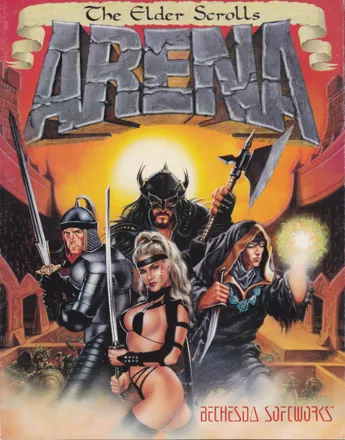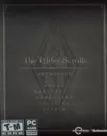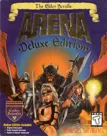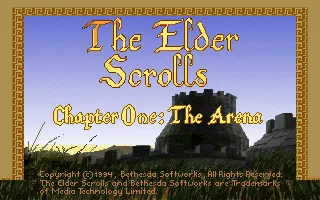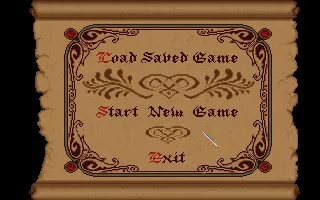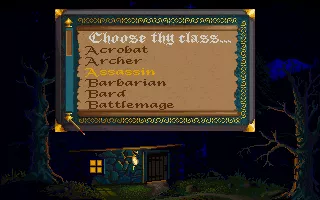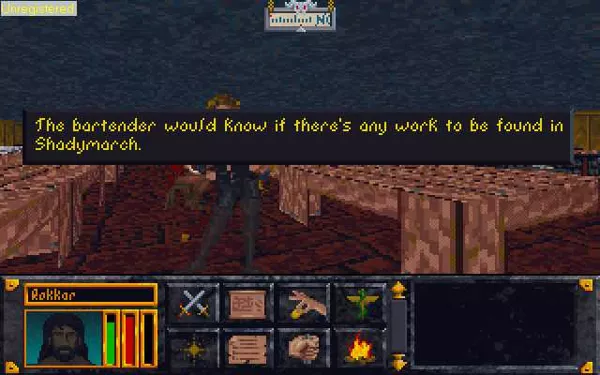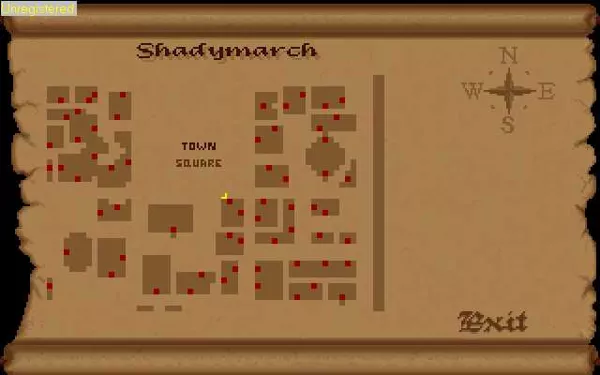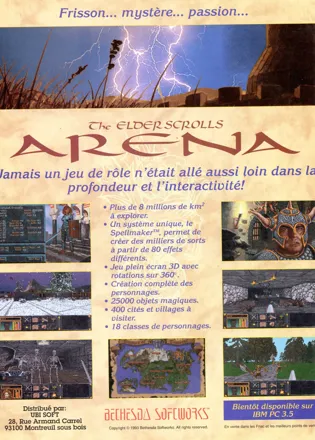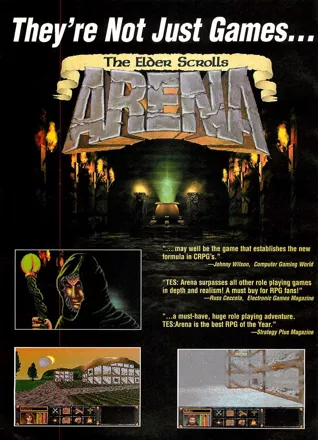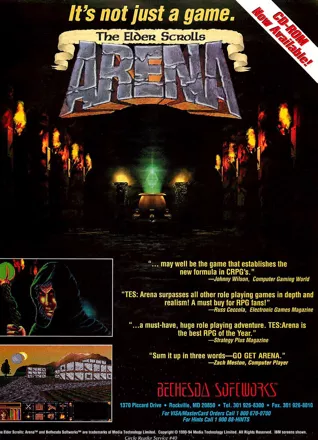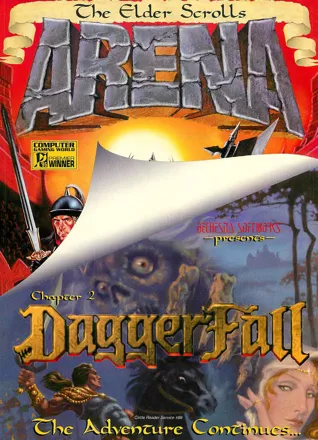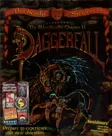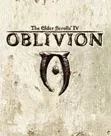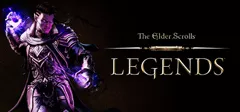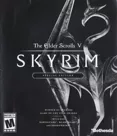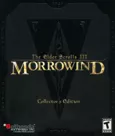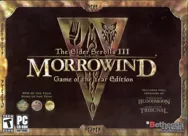The Elder Scrolls: Arena
Description official descriptions
The Elder Scrolls: Arena is a first-person action role-playing game in which the protagonist must rescue the Emperor Uriel Septim VII from his dimensional prison by recovering the eight pieces of the Staff of Chaos. The emperor's position has been usurped by impersonator Jagar Tharn, whose slain apprentice rallies the protagonist in his dreams to find the eight pieces of the staff and return the status quo.
It is the first chapter in the Elder Scrolls series and the first game that is set in the fictional world of Tamriel. The game features 3D environments, with sprites representing non-playable characters and enemies. In the beginning of the game the player chooses the race for the protagonist, based on his or her home province. Each race has its benefits: for example, Redguards from the province Hammerfell have physical attack bonuses. There is no skill system; leveling up occurs after a sufficient amount of experience points has been accumulated. The player is free to raise any of the protagonist's main attributes by allocating the points gained with the level.
Unlike later games in the series the player can travel through almost all of Tamriel, instead of being restricted to certain provinces. There are over 400 cities, towns and villages to explore, as well as many magical items and spells to create. The player can walk endlessly in any direction as more and more land will be procedurally generated. Walking manually however never allows the player to reach other cities; the fast travel feature must be used for this. The player is free to go where he or she wants. The story itself is resolved in a linear fashion, although the locations of items is randomly determined at the start of the game.
Melee combat is performed through mouse gestures and spells are cast using a menu interface. The player controls only a single character, which happens in real-time. In the wild and in dungeons the player can expect opposition from enemies which need to be defeated and who drop loot. In the cities NPCs can be found, some will barter or provide other services to the player.
The CD-ROM release features speech in cutscenes and additional rendered sequences that the floppy version does not include.
Groups +
- Animals: Cats
- Covermount: PC Action
- Elder Scrolls series
- Fantasy creatures: Elves
- Fantasy creatures: Goblins
- Fantasy creatures: Minotaurs
- Fantasy creatures: Orcs
- Fantasy creatures: Trolls
- Gameplay feature: Auto-mapping
- Gameplay feature: Character development - Skill distribution
- Gameplay feature: Journal
- Gameplay feature: Paper doll inventory
- Games with manual lookup copy protection
- Protagonist: Female (option)
- Sound engine: AIL/Miles Sound System
Screenshots
Promos
Credits (DOS version)
17 People · View all
| Lead Design | |
| Design | |
| Lead Programming | |
| Programming | |
| Additional Programming | |
| Graphics / Artwork | |
| Additional Graphics / Artwork | |
| Music | |
| Documentation | |
| Executive Producer | |
| Producer | |
| Director | |
| Playtesting | |
| Quality Assurance | |
| [ full credits ] | |
Reviews
Critics
Average score: 77% (based on 24 ratings)
Players
Average score: 3.6 out of 5 (based on 60 ratings with 7 reviews)
Under a rough surface lies an epic adventure
The Good
The World. A huge gaming world full of quests, factions, lords, ladies, and death awaited the player everytime you started a new game. A new game is certainly that..a brand new game, with new dungeons, new quests, new people. The replayability of this game was staggering
The Bad
The Bugs! Horrible bugs that just seemed to multiply as time went on. Casting magic missle often scheduled a date with the DOS prompt. You really had to save often to have any hope of enjoying this game
The Bottom Line
This game was the first of an entire series of Elder Scrolls adventures. Each new game brought forth a new perspective to the land. I highly recommend playing it even if its for the sake of seeing where it all began. If the presentation doesn't impress you, the scope will!
DOS · by MaiZure (59) · 2003
Beautiful world. Now for a story to go with it.
The Good
The world - the first-person perspective, 3-D world with day and night, seasons, weather (it rains! it snows!) just blew me away. In the towns, I could see building reflections in the puddles on the street. Sometimes I'd just stay in one place and simply watch the world go by (best at night - what a busy sky!). After I lost interest in the plot, I continued only to see what different kinds of places the designers had come up with.
The Bad
The plot - been there, done that. And while it is true that nothing forces you to do any particular thing, it's also true that the plot will not advance unless you accomplish certain specific goals in a certain specific order. And those goals are all the same goal, repeated eight times. If the game is played again from the start, the quest items will appear in different locations, but that doesn't make the game "non-linear", IMHO (or interesting enough to play again).
The endgame - that was easy. Did I simply have the best spell for that job? My character wasn't even the best spell user class!
The user interface - I'm not new at this kind of game, and I still died several times before I figured out how to even begin to defend my character against attack. And having to switch between several screens to review little pieces of information was a pain.
The riddles - the problem is not the riddles per se (some of which are quite fun), but that fact that if you can't solve one, you can't advance in the game. There's no way around needing what's behind the riddle-locked door. Another feature of linear game play.
The travel - why can't I walk from one town to another if I want to? There's inns, farms and dungeons along the way! That would be letting me do what I want, a feature of non-linear gameplay!
The bugs - once in a while the game would freeze up. Saving often helps here. The character status symbols aren't always current, which can mislead you into thinking your character is okay when s/he isn't.
The Bottom Line
It's as if, having come up with a rich, detailed fantasy world far beyond anything that had been seen before, the designers were at a loss as to what to do with it. The game itself is not nearly the quality that the environment is. The designers almost admit as much in the manual, writing that you don't have to pursue the quest if you don't want to, but can instead run around the environment killing the peasants or whatever. Maybe so, but that doesn't lead anywhere - what's the point?
Perhaps that's what they really mean by "non-linear".
DOS · by anton treuenfels (34) · 2001
Made to look foolish by Morrowind, unfortunately.
The Good
The first-person RPG was quite a revolutionary idea that has been used in future titles like Deus Ex, System Shock and Arena's sequels, Daggerfall and Morrowind.
The Bad
NPCs have the personality of a particularly boring cheese sandwich, the control and journal system gets on my nerves and plays slow on DOSBox (you can increase the speed but it messes up the sound) and made unfortunately inferior by Morrowind.
The Bottom Line
This would be a good game but I played it after playing Morrowind and the whole experience was made worse.
DOS · by Neon Hammerite (35) · 2005
Discussion
| Subject | By | Date |
|---|---|---|
| Skill system in Arena? | MrFlibble (18166) | Jul 21, 2013 |
| Release date on main summary | Izmir Egal (73) | Jul 29, 2012 |
| Term of development. | Virgil (8563) | Nov 1, 2007 |
Trivia
Development
Arena was at first, not going to be a RPG, but instead a gladiator style game. Someone came up with the RPG idea, and it caught.
Freeware release
To coincide with the 10th anniversary of the Elder Scrolls series in 2004, Bethesda Softworks released the first game, Arena, as freeware. It can be downloaded from the Elder Scrolls website
Inspiration
The Elder Scrolls: Arena was primarily inspired by a collection of pen and paper RPGs, the Ultima Underworld series, and the first-person RPG Legends of Valour.
Translations
A German version of the game was announced and the box distributed in Germany even included a sticker and post card offering to exchange the game for the German version once available. However no localized versions were ever released. One reason may have been that the game's program code is using fixed text lengths, making it very difficult to find equal length translations for other languages.
Awards
- Computer Gaming World
- May 1995 (Issue #130) – Role-Playing Game of the Year
Analytics
Upgrade to MobyPro to view research rankings!
Related Sites +
-
Official Elder Scrolls Website
Bethesda Softworks official site for the Elder Scrolls series. -
Unofficial Elder Scrolls Pages!
A wiki page that is dedicated to the Elder Scrolls series. It a great source for hints and backround information concerning the Elder Scrolls saga. Just about everything can be found here.
Identifiers +
Contribute
Are you familiar with this game? Help document and preserve this entry in video game history! If your contribution is approved, you will earn points and be credited as a contributor.
Contributors to this Entry
Game added by faceless.
Windows Apps added by Plok. Windows added by Rik Hideto.
Additional contributors: Blackhandjr, Isak, Iggi, SGruber, Patrick Bregger.
Game added January 27, 2000. Last modified March 15, 2024.
